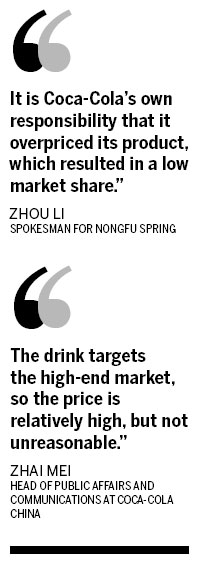It could be just healthy competition, but international beverage giant Coca-Cola says the Chinese brand Nongfu Spring copied its overall design and packaging for bottled vitamin water.
According to Zhai Mei, head of public affairs and communications at Coca-Cola China, Nongfu's Victory Vitamin Water "is visually very similar to Coke's Glacau Vitamin Water in bottle shape, size and logo design, which would easily confuse consumers".
Zhou Li, spokesman for Nongfu Spring, denied the accusation and noted it has no legal backing.
He also demanded a public apology from Coca-Cola.

"To avoid legal risks, Nongfu Spring especially consulted lawyers before the product was marketed," said Zhou.
"The designs of two products are obviously different in both label fonts and colors. We use horizontal words, while they have vertical. Our label is pure white - theirs has two colors," said Zhou.
In addition, Zhou said that Coca-Cola cannot accuse Nongfu Spring of plagiarism because it has no copyright or patent on the design, although it launched the product earlier.
Yet Zhai said the product from Nongfu is illegal because package designs of well-known brands are protected by law.
Zhou noted that Nongfu "made some changes early this year on the basis of Coca-Cola's complaint".
He contends the reason Coca-Cola is now accusing Nongfu of infringement a year after Victory Vitamin Water first went on sale is because "our beverage is far more popular with consumers than its Glacau product".
A bottle of Victory Vitamin Water sells for 3.5 yuan ($0.55), about one-third the recommended price of a bottle of Glacau.
Both have about the same additives, so the price differential could be the reason Nongfu has 6 percent of the vitamin water market while Glacau's share is less than 1 percent.
"It is Coca-Cola's own responsibility that it overpriced its product, which resulted in a low market share," Zhou said. "The drink is sold for a price deviating from its value, which has damaged rights of Chinese consumers. Coca-Cola must pay for that."
Coca-Cola responded that pricing does not justify intellectual property infringement.
"We have a strict price management system and invested heavily in research and high quality natural materials," Zhai said. "The drink targets the high-end market, so the price is relatively high, but not unreasonable."
Coca-Cola will continue to communicate with Nongfu, but does not plan to take legal action.
"We have shown kindness and sincerity from the beginning and wish to solve the problem harmoniously," Zhai said.
China Daily
(China Daily 10/19/2011 page17)

